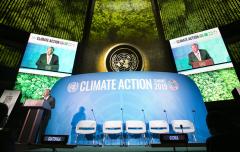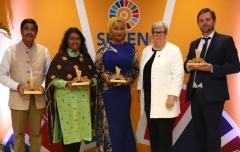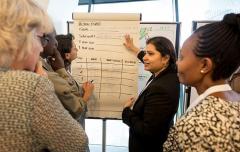Seven SEforALL 2019 highlights
Our calendars will soon flip to 2020 and we will enter the final decade for achieving the Sustainable Development Goals (SDGs), including SDG7 calling for affordable, reliable, sustainable and modern energy for all. In 2019, Sustainable Energy for All (SEforALL) acted to ensure that stakeholders in the SDG7 movement are aligned and committed to the pivotal issues and areas required for delivering universal access to sustainable energy in the next ten years. With the help of our partners, we continued to provide data and evidence to inform decision-makers and create platforms for collaboration on SDG7 targets. Here are seven highlights from 2019.
1. The 2019 SEforALL Charrettes
The release of Tracking SDG7: The Energy Progress Report 2019 revealed a clear lack of progress on SDG7, with 840 million people in the world lacking electricity access and almost 3 billion without clean cooking.
Considering these numbers, SEforALL organized a unique event to help catalyze disruptive solutions. For the 2019 SEforALL Charrettes, held in Amsterdam from 18-20 June, a purposeful list of participants from diverse backgrounds was invited to participate in intensive, two-day interactive sessions, with each charrette focused on a different issue on the critical path to delivering SDG7.
Using design-thinking, each charrette group focused their efforts on one of four areas of inquiry: private sector-led market for clean cooking, data and evidence for securing electricity access, bridging the electricity access financing gap and funding for last-mile electricity access.
By the end of the event, each charrette produced at least two disruptive solutions with participants committing to work on developing these ideas further.
A full description of the event and the solutions generated can be found in the 2019 SEforALL Charrettes Report. Or you can catch a glimpse of how it transpired by watching our Charrettes video.




